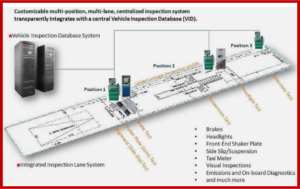 The Swedish Government has adopted regulation changes for the technical inspection of vehicles as part of the Swedish recasting of the EU’s so-called “inspection package.” The government’s decision will mandate unchanged inspection intervals compared to current intervals. Inspection intervals, arguably, can affect new car sales and have been used to force the export of vehicles to stimulate the new vehicle sales market.
The Swedish Government has adopted regulation changes for the technical inspection of vehicles as part of the Swedish recasting of the EU’s so-called “inspection package.” The government’s decision will mandate unchanged inspection intervals compared to current intervals. Inspection intervals, arguably, can affect new car sales and have been used to force the export of vehicles to stimulate the new vehicle sales market.
The EU Commission wants to modify the remuneration system to avoid financial links between technical services and manufacturers, which could lead to conflicts of interest and compromise the independence of testing.
Per the new Swedish regulation, the government said that passenger cars and other light vehicles (with a total weight exceeding 3.5 tons) shall be inspected the three years after the vehicle is first put into use, the second time within two years after the first inspection, and thereafter fourteen months after the previous inspection date.
“Sweden is one of the world’s leading countries in terms of both road safety and the environment. The government has recently decided on a new start for Vision Zero,” claims Infrastructure Minister Anna Johansson, according to the press information from the government. Furthermore, says Johansson says that “Well-functioning vehicle inspection throughout the country for both light and heavy vehicles is important for both individuals and fleet owners.”
“The government’s decision provides a good basis for the industry and Sweden to continue to develop road safety while creating large environmental and consumer benefits,” claims Magnus Greko, President and CEO of the Opus Group, which performs vehicle inspections in Sweden and other countries.
EU Position on Reform
The current type approval system is based on mutual trust. Once a car is certified in one Member State, it can circulate freely throughout the EU. While the EU sets the legal framework, national authorities are fully responsible for checking car manufacturers’ compliance. The Regulation on the approval and market surveillance of motor vehicles maintains the principle of mutual recognition, which is at the core of the EU Single Market, but seeks to correct the flaws in the system.
The EU Says the proposal for a Regulation will help achieve three objectives:
- Reinforce the independence and quality of testing that allows a car to be placed on the market: Most Member States designate technical services, which are paid directly by car manufacturers, for the testing and inspection of the vehicle’s compliance with EU type approval requirements. The Commission proposes to modify the remuneration system to avoid financial links between technical services and manufacturers, which could lead to conflicts of interest and compromise the independence of testing. The proposal also foresees more stringent performance criteria for these technical services, which should be regularly and independently audited to obtain and maintain their designation. National type approval authorities will be subject to peer reviews to ensure that the relevant rules are implemented and enforced rigorously across the EU.
- Introduce an effective market surveillance system to control the conformity of cars already in circulation: While the current rules deal mainly with ex ante controls, in the future Member States and the Commission will carry out spot-checks on vehicles already on the market. This will make it possible to detect non-compliance at an early stage, and ensure that immediate and robust remedial action is taken against vehicles that are found to be non-compliant and/or to present a serious safety risk or harm to the environment. All Member States should be able to take safeguard measures against non-compliant vehicles on their territory without waiting for the authority that issued the type approval to act. Member States must review regularly the functioning of their market surveillance activities and make the results publicly available.
- Reinforce the type approval system with greater European oversight: The Commission will have the power to suspend, restrict or withdraw the designation of technical services that are underperforming and too lax in applying the rules. In the future, the Commission will be able to carry out ex-post verification testing (through its Joint Research Centre) and, if needed, initiate recalls. By allowing the Commission to impose financial penalties, the proposal will deter manufacturers and technical services from allowing non-compliant vehicles onto the market. The Commission will also chair an Enforcement Forum which will develop common compliance verification strategies with Member States and organize joint audits of technical services and peer reviews of type-approval authorities.

